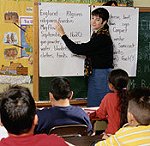正文
VOA慢速英语: Series on learning disabilities
Download Audio
This is the VOA Special English Education Report.
Today we begin a series of reports about learning disabilities.
Experts say the problem is not with intelligence or the willingness to work hard. The problem, they say, is that some people's brains process information differently.

By definition, people with learning disabilities are average or above average in their intelligence. But their disorders may affect their ability to gain knowledge and, as a result, limit their success in school or jobs.
Different people can have different kinds of learning disabilities. One person may have difficulty with language development. Another may have problems with reading or writing. Still another may have trouble working with numbers.
People can have more than one disorder, but reading is the most common area of difficulty.
Learning disabilities are neurological disorders that affect the brain's ability to store, process and communicate information. The National Center for Learning Disabilities estimates that fifteen million Americans, or five percent, are affected.
The group says three million students in the United States receive some kind of special help in school because of learning disabilities.
There are different names for different disorders. For example, a person who has difficulty reading may have dyslexia. Someone who has trouble with mathematics may have dyscalculia.
Learning disabilities may help explain why some students do not perform as well in school as intelligence tests suggest they should.
People with a learning disability may have trouble following directions. Or they may not know how to start a task. Children who have problems connecting letters with sounds or understanding what they read may be showing signs of learning disabilities.
But since these are a group of disorders, there is no one single sign to look for.
Experts say learning disabilities cannot be cured. But people can learn ways to deal with their disorders. Teachers and parents can provide support that will help students learn successfully.
In the next few weeks, we will discuss different learning disabilities as well as other disorders that interfere with learning. We will provide advice from experts about ways to deal with them. And we will examine some of the political issues raised by special education programs.
Transcripts and MP3s of our reports will be available online at VOAspecialenglish.com.
And that's the VOA Special English Education Report, written by Nancy Steinbach. I'm Steve Ember.
learning disablilities:学习障碍
相关文章
- Learning New Words: Parts of Speech and Suffixes, Part 2
- 'The Fall of the House of Usher,' by Edgar Allan Poe, Part One
- Learning New Words: Parts of Speech, Suffixes
- What Does It Mean to 'Hit the Nail on the Head'?
- Scientists Record Largest ‘Marsquakes’ on the Red Planet
- Lana Del Rey Song Teaches about Figurative Language
- Singers, Politicians, Doctors among 2022 College Graduation Speakers
- Are You Guilty of 'Sitting on the Fence?'
- Olympic Gold Medalist Wins 50th Boston Marathon to Include Women
- Reflexive Pronoun 'Oneself' and 'By Oneself'




 手机网站
手机网站